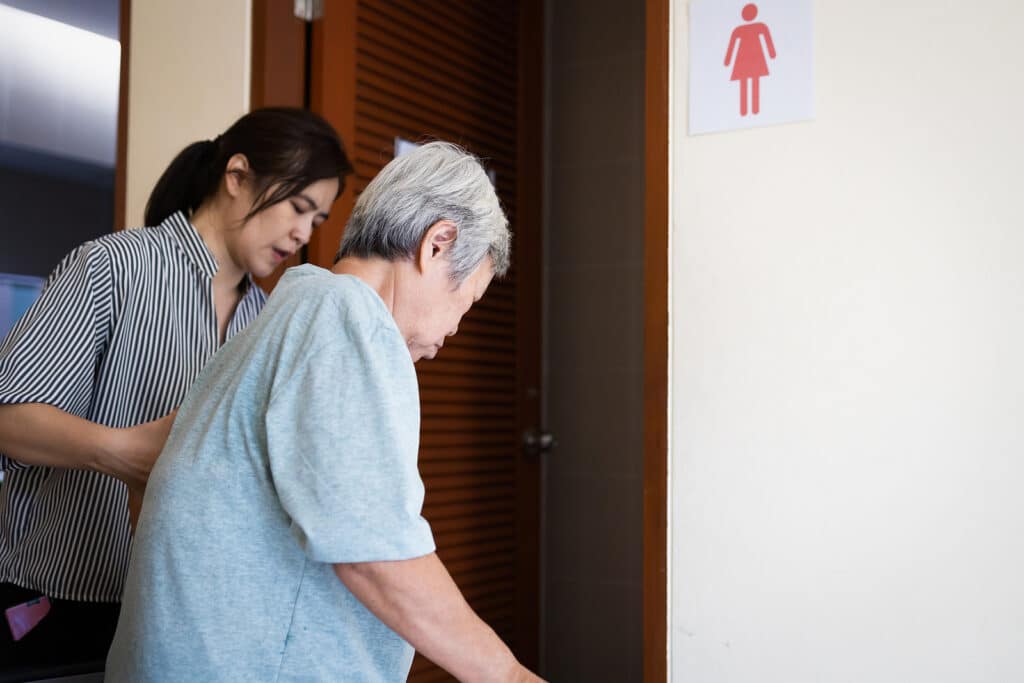Seniors with an overactive bladder or urinary incontinence are often embarrassed by their condition and don’t like to discuss it. But there is nothing to be embarrassed about. Seniors suffering from overactive bladder can try medications and lifestyle changes to help them manage their condition and reduce the number of accidents they’re having. Suppose your senior loved one has urinary incontinence, and the symptoms negatively impact their lives. In that case, you can suggest these tips for managing overactive bladder and urinary incontinence to your senior loved one:
Lose Weight
Losing weight can help seniors who are overweight with bladder issues. Being overweight can make overactive bladder and incontinence worse. It can also make seniors more prone to diseases like diabetes which can also cause seniors to have strong urinary urges. Overweight seniors should try to focus on eating a healthy, low-calorie diet and exercising as much as possible. Maintaining a healthy weight and staying there can dramatically improve a senior’s health.
Don’t Drink An Hour Before Bed
Seniors often struggle with dehydration and should drink water throughout the day. But, seniors with overactive bladders who are worried about having accidents at night if they don’t wake up or can’t get to the bathroom in time should stop drinking at least an hour before bed. Going to the bathroom immediately before getting into bed and not drinking anything, including water for an hour or so before bed, will help reduce the number of accidents your senior loved one is having.
Get Personal Care At Home
Personal care at home is an excellent investment if your senior is embarrassed because of their incontinence but needs some help to stay clean and dry throughout the day. With personal care at home, seniors can get help with changing their clothes, cleaning up the bathroom or any accidents, and ensuring that soiled clothing or other items get cleaned immediately. Personal care at home is a discreet way to take care of your senior loved one that is having trouble with incontinence.
Go To The Bathroom Regularly
If your senior loved one has Parkinson’s or Alzheimer’s and has trouble realizing that they need to use the bathroom, you should get in the habit of getting them to the bathroom once an hour. Going to the bathroom on a set schedule can help their bodies regulate the need to urinate, so they don’t have accidents at other times.
Watch Out For Infections
Urinary incontinence can lead to urinary tract infections in seniors. You should watch your senior loved one carefully for any signs of a UTI and get them to a doctor immediately if you see any. UTIs can become severe in seniors very quickly. They cause a lot of pain and can even cause seniors to be altered or confused. Anytime your senior parent has a fever, complains of pain, or seems like they are confused, you should call their doctor.
If you or an aging loved one is considering Personal Care at Home in Darien, IL, please contact the caring staff at Suburban Home Care today. 630-964-9000
There are several great reasons why Suburban Home Care® should be your choice for quality homecare. All of our Certified Nursing Assistants and Home Health Aides are screened, trained, bonded and insured.
Every family needs to be aware that almost every Homeowner’s insurance policy specifically excludes anyone working within your home. If the person you hire becomes injured while working for you, you will become personally responsible for all of their medical bills. This has left several families very vulnerable when their caregiver injured themselves at their home.
The potential to lose everything you have worked so hard to achieve seems an unnecessary risk. Every one of Suburban Home Care®’s employees are completely covered by insurance so you and your loved ones can relax knowing that if something unforeseen happens to your caregiver, they are completely covered by insurance.
- Home Care Assistance Supports ADLs and IADLs for Seniors - April 24, 2025
- What Can Families Do When Seniors Don’t Want to Talk? - April 7, 2025
- SPRING SPECIAL! - April 4, 2025



